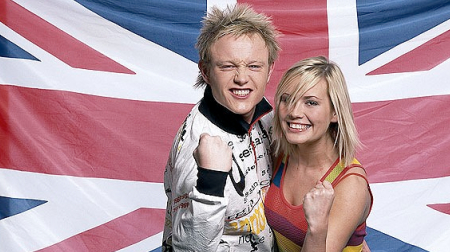‘Hold on‘, I hear regular readers of ESC Insight mentally thinking, ‘the Superbowl was this weekend, where’s Ewan’s regular article on what Eurovision can learn from the biggest live competitive TV show on the planet?‘
Well, here it is, and it’s running after the event because I want you to think about the fallout from an important piece of strategy.
No I’m not talking about Pete Carroll’s inability to call the correct running play with Marshawn ‘Beast Mode’ Lynch, I’m talking about the smarts of Katy Perry and her management team (Carroll still got it wrong, though).
It’s All About The Merch
Katy Perry was the lead performer for this year’s Superbowl Half-Time Show (along with support from Missy Elliott and Lenny Kravitz). As has become tradition, she did not ask or receive a fee from the National Football League (NFL), although the organisers of the event did pick up the bill for the production costs. Perry’s return would come from another source.
While it wasn’t seen on the television broadcast during the Half-Time Show the social media channels, the streaming broadcasts, and Perry’s online properties all started to push limited edition merchandise, content, and music, for people to buy.
I’d also expect Perry’s albums to pick up significant sales this week, just as previous performers have found. Bruno Mars (2014) reported a post-show spike in sales of his latest album of 92%, his previous album by 58%, and his full catalogue a 32% increase. Beyoncé (2013) saw an 80% increase, and Madonna (2012) 44%.
Perry not only knows the back catalogue and general interest is going to rise, but she also maximised the opportunity for engagement during her peak visibility around the world.

Katy Perry jumps the shark
Let’s also talk about how not to do it. Let’s talk about Jeremy Scott. He was the fashion designer who clothed and accessorised Katy Perry for the Half-Time Show. The fun, primary coloured outfits were not as garish as previous efforts from Madonna, or ‘working class denim’ sported by Bruce Springsteen and the E-Street Band (to name two previous half-timers). Short of designing a Royal Wedding dress, this was the moment for Scott to capture part of the chatter around his fashion. Maybe he wasn’t ready to sell any outfits, but the chance for Scott to engage with potential new fans around the world who would buy at a later date was lost.
He wasn’t ready for the exposure he must have known was coming (or he decided to not push for visibility, which frankly I find even more unbelievable).
One name (Perry) was ready to be heard around the world, to maximise the moment, and to capitalise with immediate sales and fan sign-ups. Another name was not, and let one of the biggest moments of a professional career slip by.
Now do you understand what this has to do with the Eurovision Song Contest?
Only 39 Are Chosen
Back in the days before the Internet, long before I had thought of attending the Contest, Eurovision was a world of unknown music, strange sounds, and a glimpse into a wider world. As I grew up, the night remained a fixture, with a a window into music that wasn’t straight out of the UK charts or playing at the local club Rock and Metal nights. Who were these people who had worked hard on their music and had decided to present it to the world?
Then the Internet arrived.
In that brief period where Napster created the global jukebox there was a Eurovision like no other. The name of the performers suddenly became vitally important to me, because it was about to be used as a search term in Shawn Fanning’s little disruptive monster. Would there be a fan in the far-flung corners of Europe with a copy of any album by the exotic sounding Sedat Yüce, Mumiy Troll, or Lyndsay Dracass? (I know, but I was younger). Other music services would come and go throughout the years, but the simple point was this. A Eurovision artist could live on after the show online, if they were smart enough to be ready for the rush of fans.

Jemini, Eurovision 2003, UK
That was true at the turn of the 21st century, and it’s just as true now as we approach the 60th Edition of the Song Contest. Thirty nine artists will take to the stage in Vienna, and they will all have one, perhaps two, brief shining moments when the world’s spotlight will be on them. If Eurovision is going to be a springboard to their ongoing careers, then they must maximise the opportunities to deliver results in the short, medium, and long term.
Results Mean Relevancy
Yes, social media is used to promote a Eurovision song, but that’s not the same as promoting a band or singer. They do not count towards you career. The issue with these campaigns and presence online is they are geared more towards winning Eurovision than building a career. They might be ‘Vote Malta!’ rather than ‘Vote Amber!‘, they may be run by the broadcaster’s delegation, or a third-party agency brought in specifically to promote a Eurovision bid.
They are unlikely to be run for the benefit of the artist’s career in June. Which is why a performer (and their management) need to be building up a campaign to run alongside the push for victory, to have properties easily discoverable on the night that promotes the artist as an ongoing concern, and to capture these with more than just ‘I’ll vote for that’ so they can contribute beyond the Semi Final or Grand Final vote.

Moldova’s Nearly GIrl, Donita Gherman
It’s important for the performers to take possession of their fans. That means no driving them to a ‘WinItForCyprus‘ Facebook page. They need to bring them back to evergreen properties they control. Properties where they can continue to have a dialog with them. Properties where they can capture contact details, email addresses, and turn them into fans.
And that should be a web property that will remain under the band’s complete control. Not an agency, broadcaster, or third-party. Who in their right mind would leave important details like mailing lists, social media pages, and Twitter accounts to a third-party marketing agency that is only in it for its own financial reward?
Three Steps
Nothing attracts people more than gifts, so here’s a quick three-step plan to win over anyone showing an interest in your performance. That could be at on the Eurovision stage, or it could even be an appearance at a National Final. No matter, the process can be moved around, the principle remains the same. As discussed above, this is all after you get them to a property you control.
First up, to get contact details, offer something with immediate return – many bands offer free singles, extended remixes, or even an EP release in exchange for signing up to a mailing list. Then have something to follow-up with in a week’s time. It could be the rest of the EP, the alternate edits, or a discount on merchandise (what about ‘ A Eurovision glowstick for free, just send us postage’, because you’ll likely have a lot of merchandise left over from your semi-final appearance).
The goal is to get a decent album or merchandise sale in the first month. That could be a full album, a band t-shirt, a live concert DVD, think about something that not only rewards someone’s interest, but hooks them in to the band for life.
Honestly, this should be 101 Band Marketing for everyone involved, but you’d be surprised how many performers turn up at Eurovision missing the basics that will help their career. Even an international website for your new-found Eurovision fans is something that many performers forget.
Eurovision is your stage – let the world hear you roar!









Ewan, could you could you give some examples of eurovision artists that have dropped the ball, more then once, with the very basics of building a career out of music.
But is it possable to have an article praising the artists and bands that got it right and had buit a life beyond the contest?
I hope you have great trip around Europe with all the national finals.
Matt
The two that spring to mind immediately are Petr Elfimov, and Poli Genova. No follow up, no presence, no extra material for fans to allow a following to build.
And for crying out loud, make sure your song is available on AMERICAN iTunes and Amazon while the contest is going on.
Three months later gets you NOTHING, no matter how awesome your song is. Right, Loreen?
Eric, to be fair. Stuff relating to online music stores and the like are not in the hands of said acts (most of the time, see a past artical about the Norway delegation kicking a fit about how eurovision album sales profit is spilt up and who gets what money). That kind of stuff is in the relem and hands of 3rd party’s..
Well still … what is it with the third parties then? Some of them seem to be able to work things out. I had no trouble buying a copy of “Sing Like You Mean It” last year, while “Undo” didn’t pop up until the end of June.
Most artists have no idea how to market themselves or prepare for growth. Back when record labels handled everything and the band could just focus on playing are gone. Today, many are lost at the idea and rely on their Facebook pages as a guide.